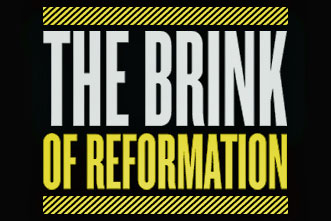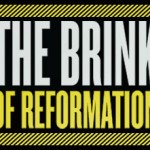October 31 is not just Halloween. It is also “Reformation Day,” which commemorates the day on which Martin Luther nailed his 95 Theses to the Church door in Wittenburg and sparked off the Reformation in 1517.
I have often thought that I would have liked to live back then. They were amazing times. There was not only great upheaval and changes within the church and theology, but these changes also took place along with the Renaissance, the scientific revolution, and eventually, the Enlightenment.
These were times of great advances in science, medicine, engineering, art, music, and theology. Imagine living during the time of Michelangelo, Da Vinci, Galileo, Newton, Wycliffe, Tyndale, Luther, and Calvin!
Well, guess what?
You are!
You and I are currently living in the middle of a new Renaissance! A new Enlightenment! A new Reformation!

The New Reformation is Here
Imagine how exciting it would have been to live in the days when the “New World” had been discovered and Spain, Portugal, France, and England were racing each other to place colonies on this new land to the West.
Well, in case you missed it, there is a race right now to put human colonies on the moon and on Mars. China, Russia, and Europe are racing to put a colony on the moon, while MarsOne, NASA, and SpaceX are racing each other to put human colonies on Mars by 2030. That’s fifteen years away.

Then there are the advances in Quantum Physics. The discoveries of Quantum Physics are unraveling much of what we think we know about time, matter, energy, and space. For example, it appears that reality does not exist unless you are actually looking at it. Furthermore, it appears that quantum particles can communicate with themselves in their past, so that events in the present can ripple back in time. Recent studies from just last week have proved quantum entanglement, that two entangled electrons can communicate with each other instantaneously, no matter how far apart from each other they are. Believe it or not, these sorts of discoveries will eventually trickle down into theology, requiring us to rethink much about creation, prayer, the afterlife, the flow of time, and numerous related subjects.
But that’s not all…
The advances toward Artificial Intelligence and discovering life on other planets threaten to undo and change everything we think we know about ourselves and about how we came to exist. For example, if life is found on another planet (and scientists are certain they will find it), what will this mean for our understanding of Genesis 1:16 that God “made the stars also”? If we are able to develop Artificial Intelligence that rapidly becomes smarter than humans, what will this do to our understanding of Genesis 1:26-27 about humans being made in the image of God?
The changes in theology are not all just potential future changes, however.
The Christian theological world is already full of upheaval. There is an earthquake going on right now in theology surrounding the issues of justification, the violence of God, the nature of the Kingdom of Heaven, and what it means to be the church–the people of God in this world.
We are living in exciting times. Times that future people will look back upon and say, “Wow! Can you imagine living in the early 21st century? There was so much going on! So many changes! Because of what happened then, the world has never been the same!”
A few things to expect in the next few decades
If history is any guide (and it usually is) the current Renaissance, Revolution, Reformation, Enlightenment will be accompanied by several factors.
Below, I have listed some factors that will contribute to the New Reformation along with some changes that we will see as a result.
1. Disaster
 First, on the negative side, it is quite likely that there will be some sort of rampant disease, catastrophe, or war which will serve as the final catalyst for the future changes.
First, on the negative side, it is quite likely that there will be some sort of rampant disease, catastrophe, or war which will serve as the final catalyst for the future changes.
This will be some sort of humanitarian crisis or a tipping point among world governments. It might be a financial collapse. It might be a medical disaster (the Black Plague helped kindle the Renaissance). It might be a war. It might be a drought and famine. It might be all of these combined.
I don’t say any of this to scare you. There is not much that can be done about it. I am just saying that usually, these sorts of disasters and catastrophes help spur the human race on toward a new level of understanding and unity, which make further advances easier.
2. Voices from Below
Second, however, as I look around at what the World Wide Web is ushering in, I think that this new Reformation will not come from the leaders and those in power, but will come from below. The internet has given everyone a voice. The gatekeepers no longer have the power to silence the masses.
Now with blogs, podcasts, YouTube, etc., anybody can make their voice heard. So the new Reformation will be led, not by a few key voices at the top of the hierarchy, but by a large number of voices near the bottom. This Reformation will be launched from the “uneducated.” From the “unschooled.” From the blogs and podcasts of the non-professionals.
So if you are starting a blog or a podcast right now, you are well situated to be one of these voices. (If you need help on these, let me know!)
3. Leadership from Women
Third, I believe that this new Reformation will contain a piece of the theological puzzle which has LONG been missing from the church. What piece is that? It is the voices of women. I firmly believe that one of the major problems with historical/traditional Christian theology is that it has primarily been written by men. As a result, theology has often shifted away from the one thing it is supposed to do, which is to engender love and relationships among people.
Voices of women will play a larger role than ever before, which will allow the church to adopt a stance toward people that has always been missing in traditionally male hierarchy.

The voices of women will bring theology and the church back to the way they were always meant to be. So if you are a woman, and want to contribute, please, start a blog, start a podcast, start a YouTube channel, write a book.
4. Direction from the Poor and the Minorities
Fourth, I believe that the new Reformation will include a new focus on minorities and the poor. I believe that new thinking and revolutionary ideas will not come from the rich and the powerful, but from those who have traditionally been ignored and silenced. Voices of the poor and the minorities will have a larger role in the changes that will occur in culture and the church.
5. Church will become less centralized
Fifth, just as the first Reformation resulted in church becoming less focused on a hierarchy of priests to lead and teach it, I believe this trend will continue in the second Reformation.
The Reformers, as wonderful as they were, still retained the Magisterial, hierarchical, building-centered approach to doing church which began after Emperor Constantine converted to Christianity.
Millions of people are now seeing how empty that structure is, and are leaving the Sunday-morning, leadership-led, entertainment-focused style of church to enter into a daily, Spirit-led, relationship-focused style of church. As I reported last week, this trend will soon become the majority trend within the church.
The church will become less and less centralized, which makes it more universal than ever.
6. Church will become a servant to the world
Sixth, as a result of church becoming less centralized, those who focus on being the church in this way will stop thinking that the job of the church is to attract the world, and will begin recognizing that the job of the church is to serve the world.
Church will become less power-centered, and thus, more powerful. This will not be the power of money and position, but will be the power that was present in Jesus – the power of truth, and light, and love.
The church will become less group focused, and more individual focused. This does not mean the church will become individualistic, but that the church will realize that our mission and our task is not to “groups” of people “over there” but to “individual people” who are next to us right now. The newfound power of the church will be the power of individuals loving individuals, rather than groups focusing on groups.
7. Scriptural Understanding Will Change
Seventh, due to all the preceding factors, there will be a radical shift in how people read, understand, teach, and apply Scripture.
 Words like “inerrancy” and “authority” and “inspiration” will drop out of use, and we will instead begin to hear more about “redemption” and “reconciliation.” That first set of words are “book-focused” which is what theology and the church have been focused on since the cry of sola Scriptura of the first Reformation.
Words like “inerrancy” and “authority” and “inspiration” will drop out of use, and we will instead begin to hear more about “redemption” and “reconciliation.” That first set of words are “book-focused” which is what theology and the church have been focused on since the cry of sola Scriptura of the first Reformation.
But now, with the focus on relationships, and love, and following Jesus into the world, the church and theology will become more relationship-focused, which is why terms like redemption and reconciliation will become more prominent.
No longer will doctrinal statements be focused on “truths to believe” as a litmus test for orthodoxy. Instead, churches will adopt “Practical statements” which will be focused on truths to practice. We will stop arguing about whether a person believes in inerrancy or not, and start debating about whether anybody is beyond redemption or not.
Ultimately, of course, all these changes in Scriptural understanding will have Jesus as their goal and focus. It is His life and teaching which will serve as the model and framework for how the church progresses into the dawn of the new Reformation and the new age that will follow.
So are you excited to be alive?
You are currently living in a new period of Enlightenment, a new scientific Revolution, and new Renaissance, a new Reformation. Does this excite you?
What do you think about the things I have written above? Do you agree? Disagree? Do you have anything to add?
What are you doing to contribute to or participate in this new Reformation? Share your ideas and suggestions below!




. Count me out on a new ‘Reformation’. Give me generation (not re:) new birth and transformation. Like the sentiment but … 🙂
When I think of the Protestant Reformation, I think of civil war, beheadings, burnings of heretics at stakes, pillaging church property. Yes, it was very thrilling. Hopefully, a modern reformation would lack the same excitement.
Ha! Yes, let us avoid that aspect of it.
Here is what Andrew Barker on Twitter just said: https://twitter.com/barkerswoof/status/659750700021321728
Just a comment of your last statement.. I think
a spelling error
So are you exited to be alive? “exited” should it be “excited”
just wondering
Vaughn Bender
Thanks! I fixed it. I really appreciate you pointing that out.
Some people predict that we are entering a new Great Awakening. My hope is that instead of restoring traditional Protestantism, we complete the unfinished work of the Reformation.
The Protestant Reformation began the necessary work of cleansing Christianity of the trappings of the Roman Empire that had crept into it after the church fathers got into bed with Constantine I. However, the Reformation stopped far short of completing that work.
Initially, all of the trappings of the Roman Catholic Church were retained, particularly in England. From the vestments (which are really nothing more than the Fourth Century CE court clothing of the Eastern Roman Empire), the canonized saints (which are essentially “Christian” demigods that replaced the pagan pantheon), the numerous feast days and holy days (which replaced pagan holidays), the statues and painted icons (which replaced pagan idols), and the episcopal structure (in which “third sons” of landed aristocrats who had no hope of inheriting their fathers’ titles and lands could become “princes of the church” with as much worldly comfort as the “first sons” and almost as much wealth and power), the Anglican Church was practically indistinguishable from the Roman Church except that they used English in the Mass instead of Latin. Even most Lutheran Churches were still liturgical.
It wasn’t until the Puritan Movement that the Protestant Church really began to eliminate Romanism from Christianity. Unfortunately, the Puritans were religious fascists; the English Civil War that their movement caused nearly completed the work of destroying the remnants of English religious history that had not been destroyed when Henry VIII nationalized the property of the Roman Church within his domain and destroyed the monasteries. Most of the Protestant denominations in the United States that are not descended from the Anglicans, Lutherans or Calvinists are descended from the Puritans (or were heavily influenced by them). We need to call on them to complete the work begun by the Puritans (but without the fascism).
We do not need a “New Reformation”. We need a complete Restoration of the church to the form that the church had immediately after Yehoshua ascended to be with his Father. We need to eliminate the pagan influence of the Roman Empire in the church and return the church to the model presented in the four Synoptic Gospels and the Book of Acts. We need to pray and meditate to determine what Yehoshua would have us do (or WWJD, “What Would Jesus Do?”) and follow that teaching, and that teaching alone. Yehoshua’s teaching in the Sermon on the Mount should be our model, not the neo-Judean teachings of Saul of Tarsus (who was not one of the original Twelve Apostles) and Yakov (James) the Brother of Yehosua (Jesus), who had not been designated by Yehoshua as the leader of the church after his departure. Our Lord, Yehoshua, designated Simon “The Rock” (Peter) to lead the church and although Simon occasionally faltered, he always seemed to find his way back to the truth. We should ignore every New Testament teaching that does not come directly from Yehoshua, and that is anything that is contained in any of the books of the New Testament outside of the first five (the four Synoptic Gospels plus the Acts of the Apostles).
https://en.wikipedia.org/wiki/Great_Awakening
Leigh Pinkston Kelly has hit it on the head! Get back the 1st century church, and everything will be as it needs to be!
I am not so sure. The 1st century church was not that great of a model. Just look at the Corinthian church. Jesus, who is building His church, does not want us to become like the church of the past, but wants to build us into the church He wants for the future.
You had me till the last sentence “We should ignore every New Testament teaching that does not come directly from Yehoshua, and that is anything that is contained in any of the books of the New Testament outside of the first five (the four Synoptic Gospels plus the Acts of the Apostles).” That is too radical for my reformation…
Luke was not one of the 12 Apostles either so…
I dunno. At first glance, in my humble opinion a lot of this(not all) sounds a lot more like a falling away than any reformation. A lot of these ideas listed here…..seems like they’d tickle a lot of ears. Is that God’s style? It seems like anything ‘offensive’ or contrary to ‘mans wisdom’ is explained away or redefined. Are God’s thoughts higher than our thoughts? Are God’s ways higher than our ways? How do we know that’s it’s truly a reformation rather than changing God’s thoughts to something that has more popular appeal?
Should we necessarily welcome all ‘reformations’ of theology? Not to bring up the ‘H’ word, and I’m not throwing that at anyone here, but it should be noted, I’d bet those that justly received that moniker in the past all saw themselves as reformers. A sobering thought.
You wrote:
Words like “inerrancy” and “authority” and “inspiration” will drop out of use, and we will instead begin to hear more about “redemption” and “reconciliation.”
If we eliminated “inerrancy” and “authority” and “inspiration”, what basis would we in the 21st century have for continuing to use the words “redemption” and “reconciliation”? On what “authority” would we believe that those things really happened or had any validity?
As far as eliminating the ‘book-focus’ that happened a long, long time ago. It saddens me. I’ve searched for years for a church that gives ‘the book’ any focus at all. Can’t find one. It’s all very subjective, ‘Jesus and me’, Jesus told me this, Jesus told me that, love, or should I say, ‘love-bombing.’ The ‘relationship’ and subjectivity have all been subtle ways to control and manipulate people to do the work of the church. ‘God is personal, and He puts other people in your life, ‘living epistles’ to guide us, and He put these people in your life to guide you, and you should do what we say, and you should engage in these ministries.’ Seems like anything and everything can be ‘divined’ to control others.
You wrote:
No longer will doctrinal statements be focused on “truths to believe” as a litmus test for orthodoxy. Instead, churches will adopt “Practical statements” which will be focused on truths to practice. We will stop arguing about whether a person believes in inerrancy or not, and start debating about whether anybody is beyond redemption or not.
For whatever reason, when I read that, this verse popped in my head:
3For the time will come when they will not endure sound doctrine; but wanting to have their ears tickled, they will accumulate for themselves teachers in accordance to their own desires, 4and will turn away their ears from the truth and will turn aside to myths.
You wrote:
If we are able to develop Artificial Intelligence that rapidly becomes smarter than humans, what will this do to our understanding of Genesis 1:26-27 about humans being made in the image of God?
My take is TRUE AI is a myth. Computers at the core are nothing but on off switches. Nevertheless, even if it were possible, I think Michael Heiser’s take on ‘being made in the image of God’ is worth investigating. He sees it closer to being: We are God’s representatives rather than a qualitative miniature carbon copy of Himself. That’s an oversimplification but the best I can do in a sentence or two.
I think the next GOOD reformation, in truth, would be the truth of the Divine Council, and Cosmic geography that Michael Heiser has so brilliantly expressed. Do a google search and you may find some very, VERY interesting stuff.
May God open up our eyes to see wondrous things in His Law.
“May God open up our eyes…”
…via google, Dave? Hahaha! Sorry, couldn’t resist!
Ha Ha! Yes! He works in mysterious ways!
“3For the time will come when they will not endure sound doctrine; but wanting to have their ears tickled, they will accumulate for themselves teachers in accordance to their own desires, 4and will turn away their ears from the truth and will turn aside to myths.”
This is the bog-standard verse to trot out whenever something ‘new’ happens! Remember that when Paul wrote this, they were in the midst of working out heir sound doctrine on the hoof. They too were part of their own ‘renaissance’.
Interestingly, I typed that line into – yes, Google! – to see if this would happen, and yes it did – the phenomenon where after only typing the words ‘when they will not’, the search engine immediately suggested the exact phrase “when they will not endure sound doctrine”. This shows just how often this phrase has been typed in, most likely by people who are looking for yet another scripture bomb to drop. Don’t use Scripture as a weapon against other people. That’s not what it’s for.
(Cue Scripture as a weapon proof-texts….)
Sounds like you just don’t like it when people use scripture. Sorry if that offends you, but I like scripture, and since this is a blog discusses theological issues, I will continue to do so. No offense intended. If you don’t like me discussing or quoting scripture verses, then feel free to ignore my posts and believe what you want.
Obviously this accusation of ‘proof-texting’ can be made anytime anybody injects scripture into a discussion. True, sometimes people ignore contexts and deceive by misrepresenting things, it’s also true that quite often people inject relevant scripture into conversation to inject Truth into it. Just because some people misuse scripture, in my opinion that’s not a good reason to stop using it. God’s word is truth. Those who worship God must do so in spirit and in truth, for such people God seeks to be His worshipers. Some of the things discussed here are not just different takes on the sign gifts, new-earth/old-earth interpretations, transubstantiation or consubstantiation issues, we’re talking about doing away with Words like “inerrancy” and “authority” and “inspiration.” You may think the verse I stated is irrelevant, that’s fine, others might find that it is relevant, which is also fine.
you wrote:
Don’t use Scripture as a weapon against other people. That’s not what it’s for.
Interesting, I merely presented some ‘food for thought.’ I didn’t tell you or anyone to do or not do anything. Yet you make an accusation and command me to ‘not use scripture as a weapon.’ and that ‘that’s not what it is for.’
Hmm…I can believe and obey you, or I can believe and obey God thru the apostle Paul. I think I’ll do the latter. Paul refers to the Word as ‘the sword of the spirit. Normally I would post the next verse, but since you are offended when I mention/use scripture, in this instance I’ll just reference the fact that the context was an imagery of a battle, shield of faith, helmut of salvation and sword of the spirit.
Oddly, I wasn’t using scripture as a weapon here, I just threw it out there. I merely said the verse popped in my mind when I read a certain section of Jeremy’s blog post, but ironically, you reminded me of Paul’s command to the Ephesians that they SHOULD use it as a weapon. Something to think about….or not.
In which case I apologise; I misread your intent in using that Scripture.
So often, we see people in these discussions doing Scripture combat by throwing verses at those they disagree with, and if that was not your intent, then that is the point at which I misread you.
Once again – my apologies.
No worries. Apology accepted my friend. The electronic medium of communication lacks nuance. Tone, expression, etc. are all omitted, and it’s easy for things to be misunderstood.
Paul says let everything you say be seasoned with grace(or something to that effect). That’s something I’ve noticed that Jeremy is very good at, presenting His view/thoughts without being overbearing and being gracious to others that might see things differently. He and others here are good that way, presenting their takes with humility. I’ve noticed that and I’m learning from their examples, how I can better season what I say with grace.
[Replying in this comment level as maximum level exceeded!] Thanks Dave. I have no doubt that we will meet in Glory and have a laugh about this 😉
Dave,
I wrote about the idea of people gathering around them teachers who give them what their itching ears want to hear in a previous post. While it can be done by people in ways you suggest, I think it is most often practiced by people who just want to hear “good, sound, biblical preaching.” Who else gathers around them a multitude of teachers more than those who seek good biblical preaching? Who else attends conferences, listens to sermons on the radio, and attends church 2-3 times a week for “good teaching”?
For many, expository preaching and teaching is an addiction which keeps their noses in the Bible while keeping them away from hurting people all around. I think more and more people are waking up to this, which leads me to believe that the church is changing to look and act more like Jesus.
It’s interesting how experiences differ from one person to the next. Truly, I wish I could find these people that have ‘expository preaching and teaching’ as an addiction. I can’t find them. I’d like to hang out with them! Ha ha. I can only find the anti-knowledge crowd, and I’m inundated by them.
Now, I do run into a lot of people(not accusing you at all) that SAY they’re into ‘expository preaching’ but when I examine what they’re talking about, it’s not expository teaching at all. Usually what happens is the preacher will take a verse or two everyone already knows, make reference to a greek word or two, but then the bulk of the ‘teaching’ is what I would consider entertainment and/or a ‘spiritual pep-talk.’ They’ll tell a couple stories from personal experience, try to make people laugh, use oratorial stylings, and ultimately the ‘application’ is: ‘fellowship, evangelism, prayer, tithing, involvement in church ministry/work.’ That’s it. Now, there’s nothing wrong with that. That’s all good, but that’s all there EVER is. It’s out of balance. I’ve engaged in all that, sat 2-3 times a week as you say, and went to the conferences, went to the prayer meetings, gave financially, engaged in all the work they want(because if you don’t, you’re in sin, or rebellion). It’s never enough, the result is burn-out, and the ‘teachings’ are merely 45 minute cliches repeated as nauseum to give people a spiritual buzz and/or control them(and to make sure butts are in seats, over time I’ve sensed marketing techniques applied to what’s presented). All this is called ‘teaching’ but in reality over a year’s time, I might hear 30-120 minutes of new material(on average about 60 minutes). In short, I never learned anything, and if you brought it up, I was told that I was being ‘selfish’ and that ‘knowledge puffs up but love edifies.’ That I needed to get out and serve more. I even get rebuked for just bringing up theological questions around the ‘water-cooler’ when people are socializing after the sermons.
I see the bible as my ‘daily bread.’ It’s my conduit to find out what God/Jesus is like. Without that, I’m clueless to even begin to try to look/act like Jesus. Since the bible is centuries old, without grammatical/historical exegesis, reading the bible can easily become a subjective, deconstructionist experience where one can easily ‘create’ whatever version of Jesus they want in their own mind. I strive to avoid that.
I agree there needs to be balance, for whatever reason but have never found it in any organized religious groups(well once, but that was 20 years ago and that church is completely different know, adopting many of the ’emergent church’ principles in order to become ‘seeker sensitive’). Thankfully there are people like Chuck Missler and Michael Heiser out there helping to address the knowledge famine.
Dave I can’t agree more. When I think of your description of “spiritual pep talks” I think of the verse “Ever learning, and never able to come to the knowledge of the truth.” This also reminds me of a portion of the book “Nazi Doctors” where the physicians designed a diet for the unwanted that would keep them eating, but would slowly kill them through nutritional deficit. I am currently attending a church whose sermons follow that exact pattern. The Pastor has announced that Decembers message theme will be “How to study the bible” I can’t wait. (sarcasm)
Thanks Dave. Exactly my thoughts stated clearly. It would seem we the world is working hard to make God politically correct. His standards have not and do not changed. Mankind has done many terrible things in God’s name but that does not and has not changed who God is.
Excellent Jeremy.
I think that this post will upset people because it is so radical, but I have been praying for a new reformation for a long time. After reading Michael Heiser, and many of your posts (which are so edifying), I am excited about the possibilities you have listed. And, after reading your “Church is More Than Bodies, Bucks, and Bricks”, I have a better understanding of the dissatisfaction I have felt for years with “church”. There has to be a change. Can’t wait to see what happens.
Thanks, Faith! It truly is thrilling times. There is so much happening and so much going on in the world and in the Kingdom of God, that every day can be filled with exciting potential. The best part is that everyone and anyone can play a part in this. This movement of God is not from the top down, but is led by the masses of Christ-followers who love and serve others as part of their everyday living.
This is an exciting blog post. Great ideas, brilliant thinking. Certainly the internet is a new publishing median, and it will usher something as big as printing press did. The future is hard to predict, but certainly ecological challenges are coming. More religious and cultural wars are also possible. Some of my friends from Islam get upset when I say I’m offended by their scriptural verses about killing, enslaving, or force conversion of all the people of the book (Jews and Christians) & general religious intolerance displayed. Certainly, they look at me strangely when I tell them I want them to blot these offenses verses out of their scriptures. Western world been moving increasingly to individualism, and now some are wanting all Christians to be lone rangers. The attitude seems to be Me and my bible that is it, I don’t need christian fellowship, I certainly don’t need church buildings or professional clergy. Ideally we need to come back and understand the flow of history, how we got to where we are, and have bigger viewpoint of the grand flow of Christianity. Totally agree that women need to be made more central to everything in Christianity, no second class citizens, we are all equal in Christ, totally.
Thanks, Collin. It really is exciting.
I also think that we are moving away from individualism. We are slowly awakening to the reality that we are all connected… and so therefore, all our actions affect everyone and everything else to some small degree.
I thought it sounded a bit jolly, i guess. I would be expecting more persecution of Christians.
Hmm. Maybe so.
Why would finding life on other worlds (something that has not yet happened) require us to cange our interpretation of scripture ? Scripture says nothing about extra-terrestrial life either for or against.
I love this! But I’m also trying to read Michael Heiser’s The Unseen Realm (on Jeremy’s recommendation also) and finish reading The Skeleton Church AND think through the resulting Deep Thoughts that result-
Plus i do it all in triplicate because i have concentration problems (the result, i am sure, of a lifetime of living in my head instead of focusing on what was under my nose ) and did i mention i love this stuff? So refreshing. …
There does seem to be a major shakeup of the Western church, as evidenced by:
1. thousands of non-institutional “emergent” and house churches
2. the ongoing highly-polarized culture wars
3. the entrenchment of a secular world view (scientism, rationalism)
4. the false hopes of gnosticism, success, therapy, politics, techne
5. the rise of fundamentalism
6. the revision of biblical authority as an absolute, propositional standard into a narrative structure
7. the Pope’s incarnational emphasis on Christ’s love
Jeremy, I would love to share your “Unbridled enthusiasm” (Seinfeld reference), unfortunately I cannot. I agree with you that there will be disasters, man made and natural. I do believe we are in the last days and that a global conflict is in the offing. This springboards to your “voices from below” section. I have heard other state that new social mediums will be the death of tyranny but I cannot agree. Man at his core is greedy, controlling, tyrannical, and will use all power to control including shutting down social media. The President has the power in case of “emergency” to do such a deed. This will drive most of the western world who follow Christ to meet as most of the Chinese believers do in small cell churches, thus the decentralized church you speak of in #6. I don’t see #7 coming to fruition, maybe in part, but not as you picture it.
For many years I have struggled with deep seated doubts about Protestantism which clings so blindly to the Reformation’s Sola Scriptura overreaction which gained its foothold at a time when ‘enlightenment’ was only just beginning to teach us how to sign our names other than with an ‘X’.
Suddenly it dawned on me that Christianity was now far better placed for the establishing of a new ‘intelligent’ Reformation, than it was 500 years ago.
So I did a ‘Google search’ for “who is going to lead a new Reformation” and up came https://redeeminggod.com/new-reformation-has-begun/